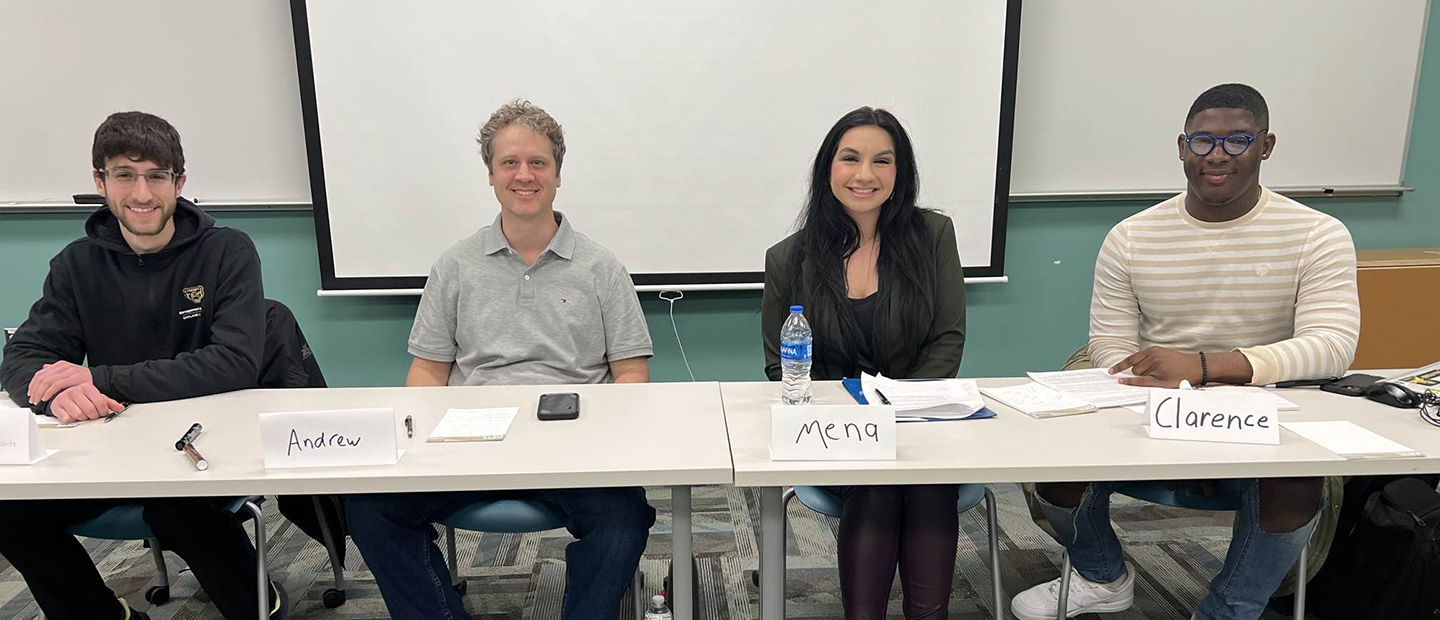Center for Excellence in Teaching and Learning
Kresge Library, Room 430
100 Library Drive
Rochester,
Michigan
48309-4479
(location map)
(248) 370-2751
[email protected]

Student Perspectives on Collaborating with Professors
In an ongoing student engagement collaboration with OU Student Congress’ Lance Markowitz, we hosted the second annual student panel, this year’s theme being “collaborative classrooms.” As an extension of this event, we invited the panelists to share their takeaways, key ideas, and hopes for the future as far as student engagement in the classroom. See the entire panel event, and sign up to hear future efforts on cultivating student-faculty collaborations in teaching and learning.
Facilitating Connection through Transparency
Lance Markowitz, Junior majoring in Spanish and General Management, Commuter Chairperson of Student Congress
Active learning promotes so much more than critical thinking in the classroom. Group/partner work, review games, and class discussions help foster a culture that increases student connection, in opposition to lecture-heavy classes, where students rarely learn their peers' names. Active learning also helps make faculty more approachable as it creates a classroom environment that feels less hierarchical than class-long lectures.
Transparency is crucial, however, in ensuring the effectiveness of active learning. One Harvard study (which is congruent with anecdotal evidence of OU faculty), found that students' reported learning more when lectured to, in contrast to their tests which revealed that active learning led to higher scores (Deslauriers et al., 2019). It is paramount that students understand this phenomenon to reduce unnecessary pushback.
Growth in the Classroom through Human Connection
Andrew Cadotte, MBA, class of summer 2025; Graduate Research Assistant, President of Graduate Business Leaders, member of the newly formed Graduate Student Advisory Council, member of OASIS.
What are we looking for as students? Obviously, we want to receive that piece of paper upon graduation; however, on the way to that end, what do we want? Personally, I want to grow, to be inspired, to learn about the many amazing career opportunities that are out there. A significant amount of our time spent as students is either in the classroom or doing class related activities. Therefore, our professors have a tremendous opportunity to impact our lives. Yes, there is a certain amount of material that must be covered, but is that everything? Are we there just to tick the boxes of what we learned? Unfortunately, the classroom and related activities are often among the most dry and lifeless aspects of our college experience. As a result, many of us approach it with a just-get-it-over-with approach. Is there nothing more to college than this?
Professors who invested years of their lives in their studies and in their professions should be like goldmines for knowledge hungry students. So where is the gap? In addition to ticking the boxes of material that must be covered, how to foster human connection in the classroom? In my experience, whenever I feel connected to the people around me, I am in the most conducive state to learn and grow. I think that each professor has to experiment, to explore and discover how best they can foster such connections, both among students and between students and professor.
Strengthening Engagement through Student-Instructor Relationships
Mena Hannakachl, Professional and Digital Writing major senior, Embedded Writing Specialist, Peer Mentor, and an Admissions Ambassador
Fostering a student-instructor connection that extends beyond class material and content can be beneficial in increasing student engagement. When students are more connected to their instructors, they tend to be more motivated and interested in their learning, which often leads to mentorship and collaboration. Moreover, focusing on relationships in the classroom can also foster connections among students. Instructors assigning assignments that involve their peers can promote community building, where students know each other. This can lead to better student engagement and a strong sense of belonging.
Additionally, rethinking grading methods and assessment can make a difference in student engagement. Providing a space where students aren't overly concerned with their grades creates a better learning environment. For example, implementing “low stakes” assignments can invite students to attend class, seek help, and offer feedback to their instructors.
Save and adapt a Google Doc version of this teaching tip.
Others may share and adapt under Creative Commons License CC BY-NC. View all CETL Weekly Teaching Tips. Follow these and more on Facebook, Twitter, and LinkedIn.



